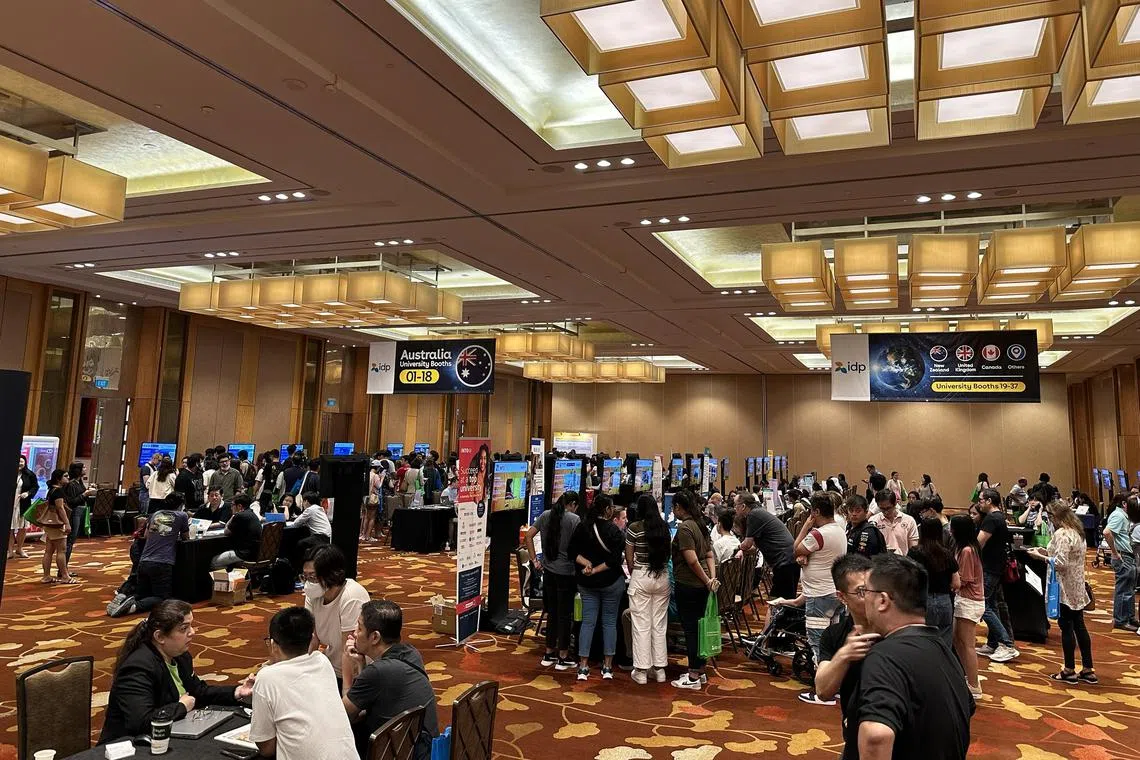Gen Zers do not want to just study overseas, but also work and live abroad
Sign up now: Get tips on how to grow your career and money

An IDP Study Abroad Education Fair held in January at Marina Bay Sands. Overseas education counsellors say the majority of Gen Z Singaporeans have a strong preference to study in the US, Britain and Australia.
PHOTO: IDP SINGAPORE
SINGAPORE – Mr Jonathan Lim, 24, was offered a place in a local university, but headed abroad to University College London instead to study mathematics.
Mr Lim, who is now in his final year of study, feels that studying abroad has made him more independent and resourceful. He also knows that living in London, one of the world’s top financial capitals, will make it easier for him to have a career in quantitative finance.
He says: “There is just too much structure and comfort at home. I feel living overseas will force me to grow up faster and fend for myself. Also, in the quantitative finance field that I am interested in, London is one of the best places in the world to chalk up some work experience.”
His comments echo the sentiments of Gen Z Singaporeans born between 1997 and 2012, who are heading overseas not just for degree studies, but also to work afterwards, so they get a head start in their careers.
Overseas education counsellors, who provide information and help students with their applications to universities, say the majority of Gen Z Singaporeans still have a strong preference to study in the United States, Britain and Australia.
There was a drop in Singapore student numbers during the Covid-19 pandemic, but latest figures show that demand is climbing back to pre-pandemic levels and likely to exceed them.
About 6,800 Singaporeans are now enrolled in British universities, taking up undergraduate and postgraduate degrees.
In the US, the Open Doors 2023 report and other sources state that there were 3,183 Singaporeans enrolled in its universities.
Australian government figures show that the number of Singaporeans enrolled in universities there is close to 6,000.
In recent years, Gen Zers, who are hyperconnected with their peers across the planet through social media and interested in different cultures, are also heading to South Korea, some European countries and Japan, reported to be the fastest-growing destination among Gen Zers and millennials in an American Express Travel survey.
But wherever the destination, Singaporeans will make a beeline for top universities.
Ms Kelly Cheong, senior education counsellor at IDP Singapore, one of the largest agencies providing information and counselling for those heading abroad, says: “Singaporeans, especially if they have the grades, still want to go to the top-ranked universities.
“In Britain, it is the Oxbridge universities and the likes of London School of Economics and Political Science, University College London and King’s College.
“In Australia, it is the University of Melbourne, University of Sydney and University of New South Wales.”
In the US, it is the eight Ivy League universities, such as Harvard and Yale, and the likes of Stanford University and the Massachusetts Institute of Technology.
Ms Cheong adds: “Most of them are supported by their parents. But they are mindful of the costs and want it to be worth the money they are going to spend.”

Mr Jonathan Lim, who is studying in University College London, feels that living abroad will make him more independent and resourceful.
PHOTO: COURTESY OF JONATHAN LIM
Education over four years at the Ivy Leagues can cost as much as half a million Singapore dollars.
The British universities, which offer mostly three-year degrees, will cost a student about $60,000 a year in fees and living expenses, although at the top universities, the costs can rise to $80,000 a year.
Those heading to the Australian universities would need to put aside about $60,000 to $70,000 a year.
In terms of courses, a significant number apply to British and Australian universities to take up medicine, dentistry and law.
Dr Chan Khai Leok, a Cambridge alumnus who runs overseas education consultancy theRightU, says: “In Singapore, there is still a preference for these high-earning professions among the young, just as it is with their parents. Those aiming for these degrees also try for local universities, but know that places are limited in Singapore.
“It is still competitive to get into courses such as medicine, dentistry and law at overseas universities, but not as difficult as it is at local universities.”
Several students enrolled in medicine, dentistry and law say they also chose the courses because of specific interests they have developed since they were young.
A student debater from her days at St Margaret’s School, 20-year-old Ashlyn Cheong says law was a natural choice.

Former student debater Ashlyn Cheong, who is studying law at Oxford University, says the course was a natural choice for her.
PHOTO: COURTESY OF ASHLYN CHEONG
Over the years, she started reading about geopolitical events and world issues, and wanted to advocate for marginalised groups.
“Protecting the vulnerable must involve changing the laws that disenfranchise them. This piqued my interest in studying law, as I saw it as an engine for change,” the Oxford University student says.
Ms Priscilla Lim, 19, who is applying for a place to study medicine in Australia, says she previously had not considered medicine, as she thought it may be too difficult for her.
But after a stint working with terminally ill children, she set her heart on medical research on childhood diseases and is prepared for the hard work.
She adds: “I am trying for an Australian university, as I have heard that they are slightly easier to get into, compared with the local universities. I feel that Australian universities also have a practical and applied teaching bent, which suits me.”
EducationUSA adviser Olivia Ding says a large number of Singaporeans who head to US universities are interested in computer science.
She says: “Computer science degree programmes in the US are among the best in the world, and many Singaporeans aim for the very best, be it the Massachusetts Institute of Technology, Stanford or Berkeley. If they want to notch up some work experience, many of the major tech companies are headquartered in the US.”
The US Open Doors 2023 report says that among the 1,057,188 students enrolled in US institutions in 2022/23, about 20 per cent studied mathematics or computer science.
Education counsellors say a small but increasing number of Gen Z students are also going for creative arts courses, including fine arts and culinary arts. Quite a few are also interested in veterinary science and allied health courses.
Ms Cheong from IDP says: “We send quite a few students every year to study veterinary science in Australia. There are many who are interested in allied health degrees – be it physiotherapy or occupational therapy. They know there is huge demand because of the shortage in these fields. The other attraction for some is that they will be able to set up a practice.”
Ms Chrystabel Ng, 19, who is going to the University of Sydney to study veterinary science, says that although she won a place in a local university, she decided to go overseas because she wants to study veterinary science.
The course will take six years and cost her parents about $500,000.
On why she picked veterinary science, she says: “This may sound cliched, but I do love animals. Not just dogs, which I have always had as a pet, but also all kinds of animals. In fact, I am hoping that I will be able to stay on and work in Australia, so I have the opportunity to work with bigger animals.”
Former St Joseph’s Institution student Gareth Chong, 22, who took up music as a subject in his secondary school and junior college years, went to King’s College London to further his music education.
He feels that it is not unusual for Gen Z Singaporeans to take up fine arts degrees, including visual arts, performing arts and creative writing. After all, his generation has been exposed to these art forms from a young age.
“Like a lot of my peers, I started learning how to play the violin when I was four. At first, it was a chore, but I grew to love it.”
He says parents of Gen Zs are also more open to their children studying the fine arts.
“Although I was faced with the same questions on job prospects for music degree holders, my parents encouraged me to follow my passion and interest, although heading to Britain for three years will cost quite a bit,” he adds.
Overseas education counsellors say obtaining work experience in the destination country is a very important driver of student demand.
Dr Lissy Vadakel is the country director at British Council Singapore, which offers advice and guidance on study options available to Singaporeans heading to Britain.
She says that, based on the questions asked by Singaporeans heading overseas, the ability to work in Britain is an important factor.
“Many ask about the possibility of staying on after they graduate. While this might not necessarily correlate with a long-term intention to migrate, young Singaporeans do want to have the option of being able to work in Britain for a few years after completing their studies.
“There could be more diverse career opportunities for them there, and working for a few years in cities like London, Manchester and Edinburgh could give them a strong head start in their careers, as well as further global exposure.”
Under the graduate route visa launched in 2021, Britain allows international students to apply to stay in the country and work, or look for work, upon graduation. There are no meaningful figures available yet on how many Singaporeans have taken advantage of the scheme.
For the US, some figures – such as the number of Singaporean students who participated in the Optional Practical Training (OPT) programme – shows an increasing trend of Singaporeans staying on to gain practical experience that complements their formal education.
According to figures from the Open Doors 2023 report, which tracks international student numbers in the US, 907 Singaporeans took part in the OPT programme. In the previous year, it was 732.
The comments tally with a 2021 survey done by Into, an education and recruitment partner to universities, which studied Gen Zers’ motivations and aspirations for overseas studies.
Its survey of 1,200 students around the world found that the Covid-19 pandemic had instilled a sense of pragmatism in Gen Z students.
The pandemic did not dent Gen Zers’ passion for learning. Among the respondents, the overwhelming majority said they cared a lot, even passionately, about learning.
They were, however, concerned about job prospects, and headed to universities that would help them find success in their careers and lives.
They saw their international education as inextricably linked to their future success and felt their international education would open doors to working abroad, with 76 per cent saying that they would like to work overseas one day.
They were also more purpose-led in their pursuit of higher education abroad as a result of the pandemic.
Mr Tom Hands, Into’s chief recruitment officer, says: “Gen Z students care about an institution’s track record on issues such as gender equality, racial justice and, of course, the environment. An overwhelming proportion (86 per cent) seek an international degree, so they can one day make the world a better place.
“We are witnessing a shift in students’ perceptions. In Singapore, for example, Gen Z students now consider a much wider range of subjects compared with their predecessors. Nowadays, we receive inquiries for environmental sciences, artificial intelligence, design, art, music, politics and other humanities subjects.
He adds: “Currently, millions of students worldwide, the majority of them being Gen Z, are looking to study abroad. With this trend forecast to grow over the coming years, it will be interesting to see how they make their mark on the world.”



